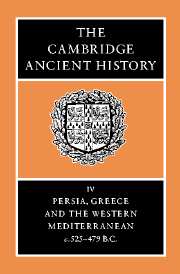Book contents
- Frontmatter
- Contents
- List of maps
- List of text-figures
- List of chronological tables
- Preface
- PART I THE PERSIAN EMPIRE
- PART II THE GREEK STATES
- PART III THE WEST
- 12 Italy from the Bronze Age to the Iron Age
- 13 The Etruscans
- 14 The Iron Age: the peoples of Italy
- 15 The languages of Italy
- 16 Carthaginians and Greeks
- BIBLIOGRAPHY
- Index
- Map 1. The Achaemenid empire
- Map 6. Central Asia
- Map 9. The Black Sea area
- Map 11. Egypt
- Map 13. Greek and Phoenician trade in the period of the Persian Wars
- Map 15. Greece and the Aegean
- Map 18. Northern and Central Italy
- Map 19. Central and Southern Italy
- References
13 - The Etruscans
from PART III - THE WEST
Published online by Cambridge University Press: 28 March 2008
- Frontmatter
- Contents
- List of maps
- List of text-figures
- List of chronological tables
- Preface
- PART I THE PERSIAN EMPIRE
- PART II THE GREEK STATES
- PART III THE WEST
- 12 Italy from the Bronze Age to the Iron Age
- 13 The Etruscans
- 14 The Iron Age: the peoples of Italy
- 15 The languages of Italy
- 16 Carthaginians and Greeks
- BIBLIOGRAPHY
- Index
- Map 1. The Achaemenid empire
- Map 6. Central Asia
- Map 9. The Black Sea area
- Map 11. Egypt
- Map 13. Greek and Phoenician trade in the period of the Persian Wars
- Map 15. Greece and the Aegean
- Map 18. Northern and Central Italy
- Map 19. Central and Southern Italy
- References
Summary
INTRODUCTION: THE NATURE OF THE EVIDENCE
From Livy's account (IV.60.9–V.I) of the Etruscan reaction to the Roman declaration of war on Veii at the end of the fifth century, we may glean the following impressions: separate Etruscan city states, normally with republican governments, were organized in a League of Twelve Peoples; the League was capable of meeting in full council at the federal sanctuary of Voltumna and of debating questions such as that of aid to Veii. In this instance, the decision to withhold all assistance found justification in the twin outrages committed by the king of Veii: on republican sentiment by his appointment; and on religion by his impious termination of a festival because the Twelve Peoples had not elected him priest. Livy is clear enough: the first offence compounded the second: the other states opposed aid to Veii principally on religious grounds. It might be thought, therefore, that the League was a merely religious assembly. But we know of no other kind of assembly: so it is more likely that the League concerned itself with the religious aspects of conduct in all spheres of life, including national politics, because those aspects were self-evidently the most important – a point of view as difficult, in some quarters, of modern comprehension as definitions of the Veii decision as ‘apathetic’, ‘lacking in national sentiment’ and ‘politically blind’ would have been in fifth-century Etruria. Such an interpretation of the League's importance accords well both with Livy's explanatory remark that the Etruscans were more concerned than any other nation with religious matters (V.I.6 –gens itaque ante omnes alias eo magis dedita religionibus quod excellent arte colendi eas) and with the archaeological evidence for the massive expenditure on the construction and maintenance of local sanctuaries all over Etruria from the late seventh century owards.
Keywords
- Type
- Chapter
- Information
- The Cambridge Ancient History , pp. 634 - 675Publisher: Cambridge University PressPrint publication year: 1988
References
- 5
- Cited by

